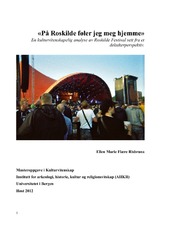"På Roskilde føler jeg meg hjemme". En kulturvitenskapelig analyse av Roskilde Festival sett fra et deltakerperspektiv.
Abstract
In my master thesis I have studied the Danish music festival Roskilde Festival and its participants, the visitors at the festival. I have conducted interviews and fieldwork among the participants at the festival. The thesis therefore takes the participants’ perspective and their experiences as its point of departure. The text begins with a discussion about what festivals are and their origin. Modern music festivals as we know them today first started appearing in the 1960s, and there are still some similarities between the first music festivals and the Roskilde Festival. 1971 was the first year of the festival, and it is now the largest music festival in the Northern Europe. The first part of the analysis focuses on the participants’ experiences at the festival and why they chose this particular festival. The second part of the analysis in centered around the meaning of the term ‘place’. How do the participants make their own camps and decorate them? The process of doing it together is often more important than the result. The festival itself can be compared to the medieval carnival where the world was turned upside down. It can also be seen as an example of public rituals. The sense of community is the essence of the festival. It can also be seen as a sanctuary where other rules apply.
